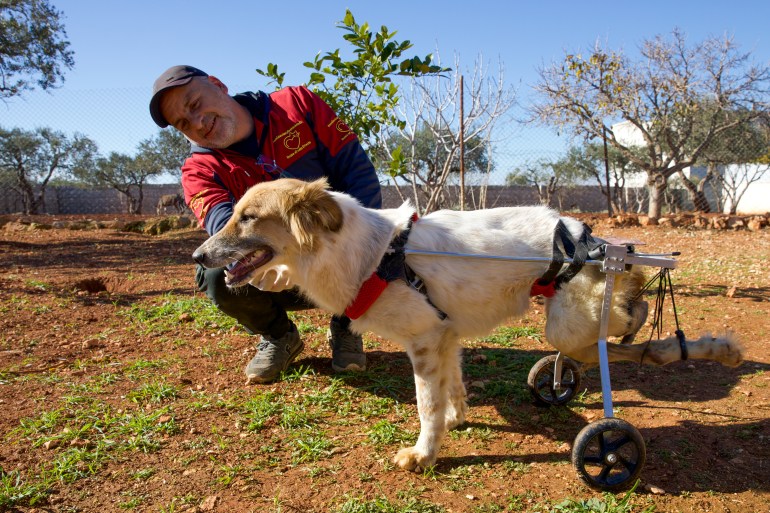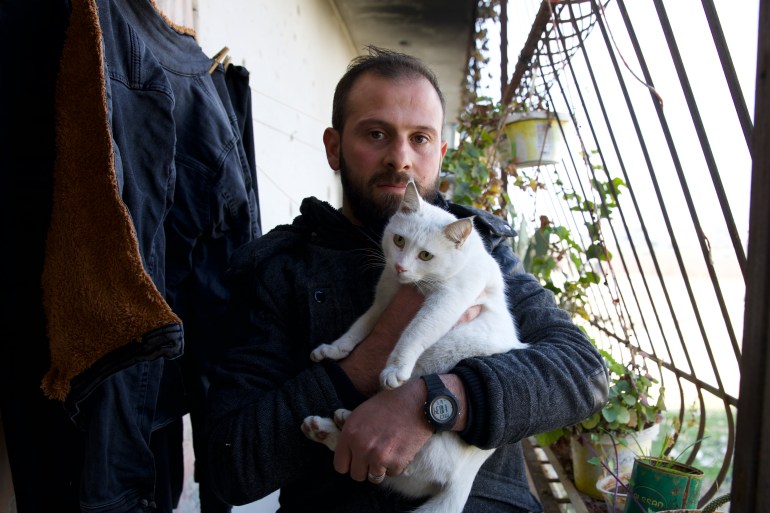Northwest Syria’s love for puppies, kittens blooms a year after earthquake | Turkey-Syria Earthquake
Idlib, Syria – Hundreds of cats and dogs are running around, chasing each other and playing in Ernesto’s Paradise For Animals Under War on the outskirts of the city of Idlib.
They are well-fed and obviously under the care of a vet – and Muhammad Wattar, who runs the shelter, is proud of providing that.
When two massive earthquakes struck northwestern Syria and southern Turkey on February 6, 2023, Wattar’s team mobilised to save more than 1,300 animals on the Syrian side of the border, working 16 hours a day to find and transport them.
“At first, people weren’t interested in rescuing the animals because humans needed quicker rescue, but then they started encouraging us,” Wattar said.
It is not clear what led to the change, but several people Al Jazeera has spoken to have pointed to a widely held belief that animals can warn their owners of an impending natural disaster.
Whether because of that or because more people are appreciating the comfort of a four-legged friend after the loss and destruction of the earthquakes, the demand for adopting pets of all species has skyrocketed.

Wattar is happy there is so much interest and told Al Jazeera that the number of people wanting to adopt a cat has tripled over the past months, which is great because there are plenty of animals needing a home.
About 2,300 live in Ernesto’s Paradise right now, all of whom are being fed, cared for and treated by the team.
“Many animals were injured,” he said, walking towards Poppy, a dog who was tied up when the earthquakes struck. A wall fell on her lower back and paralysed her – and she lost her left leg.
Last year’s earthquakes killed more than 4,500 people in northern Syria, destroyed 10,600 buildings and displaced hundreds of thousands of people.
Those who have survived are in a state of constant tension and fear, and months of aftershocks have neither made things any easier for them nor has it reduced their stress.
A natural warning system
Muhammad Halabi, who lives in Ariha south of Idlib, swears he can tell how intense an aftershock is by the reactions of his four cats.
“When a simple aftershock happens, they feel it, but they’re not intensely afraid. Then when the aftershock is strong, they rush to hide in narrow places or slam against the wall and mew loudly,” Halabi said.
Before dawn on February 6, Halabi was awakened by his cat Sally scratching insistently at his blanket.

“I noticed the ground shaking, but I thought I was dizzy, and then I realized it was an earthquake,” the 34-year-old told Al Jazeera.
“I picked up my cat and rushed out of the house.”
Ariha was not one of the areas that were badly affected by the magnitude 7.8 earthquake, the first of two that day, but its buildings are fragile and damaged by repeated bombing campaigns by the Syrian regime and its allies, which keeps people there in fear of homes tumbling down in any one of the aftershocks.
After February 6, the use of earthquake warning applications became widespread in the region, but their users still did not feel it was enough.
Because earthquakes are disasters that happen with only seconds of advance notice, and so far, scientists still cannot predict their severity, people have put their faith in animals to predict earthquakes.
Most of Halabi’s friends became animal owners after last year’s quakes, most choosing cats and birds on his advice that they are most likely to be aware of approaching earthquakes and aftershocks.
Breeder Muhammad al-Omar and his neighbours were confused by the frantic barking of his five dogs during the night of February 6.

“They sounded strange. We breeders know that that indicates danger.”
While people may have noticed animals behaving strangely before the earthquakes and did not attribute much importance to it at the time, things have changed since then, and they now rely on animals’ senses.
Dogs’ high sense of danger made the 33-year-old feel safe. “I heard their voice as I was coming home one day, and I knew there was an earthquake, so I took cover, and it happened and it was strong,” al-Omar said.
The dogs themselves can hide and take cover when they sense danger, but they become extremely stressed if the vibrations are prolonged, and they bark constantly. “The first time we did not know what was happening to them, but when the second earthquake occurred, we learned that they were alerting us.”
The second quake on February 6 was magnitude 7.6. Both tremors were centred in southern Turkey.
Al-Omar’s house in the city of Binnish, north of Idlib, suffered some damage, but he and his family were safe thanks to the warning they got from the dogs.
Al-Omar shared those warnings with his friends and family via a WhatsApp group, and after that, many started to consider raising pets of their own.

Source link




